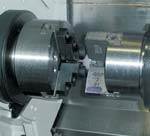Strong Medicine For Growth
A New Jersey shop that specializes in medical work combines the latest hardware with innovative software to gain a competitive edge.
Share



Finding good news among current reports about the metalworking industry is no easy task. The combination of weakened demand for consumer goods, a nagging shortage of trained workers and strong foreign competition has created some serious concerns. Focusing on short-term business cycles, however, can exaggerate the hazards of an occasional detour. Thus, some pessimists view the current slowdown as an indication that American metalworking shops may be losing their competitive advantage in the global economy.
But in the medical machining business, where the heyday of American manufacturing is still in full flower, no one subscribes to these gloom-and-doom prophecies. Underscoring this exceptional optimism, a recent U.S. Department of Commerce report states, “U.S. manufacturers of medical equipment dominate almost every export market and consistently earn the country a large trade surplus for this sector. This industry brings money into the U.S. economy and creates high-tech, high-skill jobs, while providing our trading partners with the highest quality, most innovative medical devices in the world.”
Because it’s less affected by cyclical fluctuations in consumer and government spending than other manufacturing sectors, medical machining continues to enjoy strong and steady growth. Furthermore, the demographics of America’s domestic population, as well as surging international demand for high-quality medical devices, promise to make medical machining a very strong business for years to come. In 1999, the U.S. Department of Commerce reported that the value of industry shipments for surgical appliances and supplies was $17.9 billion, while shipments of surgical and medical instruments totaled an additional $20.2 billion.
Seeds Of Growth
Although this prosperous environment supports a number of large and well-established manufacturers, it also creates many opportunities for newcomers who can leverage new technology and organizational flexibility to meet their customers’ ever-changing needs. Bob Tarantino, president of New Jersey Precision Technologies, Inc. (Mountainside, New Jersey), personifies the ingenuity that continues to create and sustain growth in this expanding industry. His company is an excellent example of how entrepreneurship is cultivated today by effective partnerships between the public and private sectors.
Mr. Tarantino was a guest of honor at the 2000 State-of-the-State Address delivered by former Governor Christine Todd Whitman to the New Jersey legislature. On that occasion, his firm was recognized as an example of the success of New Jersey’s Technology Business Incubators program. This program provides various types of start-up assistance for entrepreneurs who are committed to establishing high-technology businesses in the state. A recent state report reveals that 104 firms have graduated from this program, representing a success rate of 77 percent. These firms have generated a total revenue of more than $38 million.
In 1989, under the auspices of the New Jersey Institute of Technology, Mr. Tarantino and his former partner established their original machine shop in an old industrial building in Newark. Beginning with only four employees and first-year sales of $50,000, the firm graduated from the incubator program with 20 employees and $2 million in sales. In 1995, Mr. Tarantino became sole proprietor of the firm.
Tools For Success
The company specializes in medical and related work, including production-line and packaging components for the pharmaceutical industry and prosthetic devices. Medical work accounts for approximately two thirds of the company’s business, with the balance consisting of ordinary job-shop work, mold components and tooling for plastic extrusion operations.
At any given time, the shop’s medical work includes a mix of prototypes, new product launches and full-scale production runs. This reflects the nature of the medical device industry, where a continuous cycle of research, testing, product development and high-volume production is ongoing. Like other forward-looking machine shop managers, Mr. Tarantino’s general philosophy is to obtain the very latest and best technology, and then to leverage this technology by automating repetitive tasks. He cites the maxim, “You pay for the tools that you don’t buy” as the foundation of his approach.
Pursuant to this philosophy, the shop’s physical space is divided into two main departments—one for EDM work and a second for CNC machining centers—equipped with the very latest technology. Mr. Tarantino believes in standardizing the machines in each department. Thus, his EDM department uses Mitsubishi machines (FA20 wire machines and EA8 ram machines), while his second department employs Haas machines (VF2, VF3 and Mini-mill).
Mr. Tarantino cites two important advantages that his shop gains by standardizing equipment. First, he maintains a close relationship with his vendors to handle any ongoing needs. Second, because each department uses machines of the same brand, many parts are interchangeable. This lowers the cost to stock spare parts and helps reduce downtime when repair or maintenance is necessary.
A substantial portion of the shop’s work consists of lights-out machining. Mr. Tarantino’s EDM department is equipped with a fully automated cell that consists of two wire-EDM machines served by a robotic system manufactured by System 3R (Totowa, New Jersey). The shop operates two daily shifts and, on a typical workday, the second shift prepares the automated cell for overnight operation.
Rules Of The Game
Although the machinery and processes are essentially the same in medical machining as they are in other metalworking businesses, some key factors distinguish medical related work. First, quality control requirements for medical devices are more stringent than is true for the majority of parts produced by conventional job shops. Consequently, a machine shop that produces medical components must exercise strict control of part lots and batches, while maintaining careful documentation.
Because specific batches of parts are separately tested and certified by customers, mixing batches or substituting materials is prohibited. Customers also conduct periodic audits of medical manufacturing operations to ensure compliance with these standards. Additionally, customers insist on high levels of cleanliness in their suppliers’ machining facilities. For example, employees at New Jersey Precision are not permitted to take food into the shop area. According to regulations of the U.S. Food and Drug Administration (FDA), the shop also maintains a segregated quality control area that qualifies as a Class 10,000 cleanroom (containing less than 10,000 contaminant particles of 0.5-micron particle size per cubic foot).
Due to the environment in which they are used, materials for medical machining must be highly resistant to chemical reaction. Typically, these metals are also much harder than those used for non-medical purposes. While titanium alloys and cobalt chrome are the principal workpiece materials for medical devices, New Jersey Precision also uses hardened stainless steels and tool steels to fabricate mold and die components.
Certain factors specific to medical practice and human psychology have important impacts on shops that specialize in medical machining. For example, a substantial reduction in the average length of hospital stays in recent years has also shortened the lead times demanded by customers for delivery. This is particularly true of special medical devices and implants. Although New Jersey Precision’s business had previously been growing at a steady rate of approximately 3 percent per month, some flatness has now occurred in the market for devices that are used in elective surgeries. Mr. Tarantino believes this is the result of the current economic uncertainty that makes people more reluctant to take time away from their jobs to undergo non-essential operations. But this temporary reduction in growth is a relatively minor problem in view of the negative returns experienced recently by other metalworking shops.
Because a substantial portion of New Jersey Precision’s work consists of prototype or just-in-time production, customers realize—and have come to expect—that the shop will respond rapidly to their requests. Thus, it’s quite common for Mr. Tarantino to receive a phone call from an important customer who wants an order filled within 24 hours. A customer who needs a single prototype or an immediate replacement for a unique part will sometimes call early in the morning to place the order, then send someone to the shop the same day to take delivery. Although this seems to strain the definition of JIT manufacturing, any shop that does a substantial amount of medical work must be flexible enough to respond rapidly to these periodic requests.
To achieve this flexibility in an expanding market, it’s very important for medical machine shops to be located near important customers. In response to this need, Mr. Tarantino has opened a second EDM shop in northern New Jersey and soon will open a third machining facility in Cleveland, Ohio.
A Program That Programs
Perhaps the most innovative way that Mr. Tarantino meets his competition, however, is the software system he uses to control his shops’ operations. Using programming experience gained during a previous job at Hewlett-Packard, Mr. Tarantino wrote this control program from scratch using Fortran language. Essentially, the program is an automatic post processor that eliminates the need for the shop to have engineers or operators continually rechecking data and programming machine tools.
The software automatically interprets both the geometry and textual notations in a customer’s part data or blueprint. After this data is received by the system, the program automatically performs an error check and generates red circles that identify any incorrect or missing information. It also analyzes and identifies any conflicts in the data that will affect machining of the part. Because many of Mr. Tarantino’s jobs involve precision alignment of holes or edges, his program’s capability to automatically compensate for nominal setup variations saves a considerable amount of time when parts are loaded.
Besides removing the possibility of human error from programming, this software system also eliminates the need to maintain redundant CNC and CAD databases. New Jersey Precision keeps only a single database, and the shop doesn’t need to save any part programs because the operating software automatically generates and error-checks programs each time they are downloaded to the shop’s local computers for transfer to MCUs. Because the software streamlines his overall production process by eliminating a substantial amount of programming work, Mr. Tarantino enjoys an important advantage in a very competitive industry. For this reason, he prefers to keep his invention as a proprietary resource, and he has no plans to market it.
Preparing For Tomorrow
Training is a very important component in the success of the shop’s 25 employees. The company participates in a state-certified apprentice training program that provides basic instruction for new employees. Additionally, all employees receive training in current good manufacturing practices (CGMP). Every two months, the company supplements this training by sending each employee on a “field trip” that may involve visiting a customer’s production facility or perhaps attending an industry tradeshow. This experience helps employees understand the connection between their work and customers’ needs, and it also enables them to keep abreast of new developments in metalworking that can improve productivity.
As a measure of his confidence in the company’s future, Mr. Tarantino is firmly committed to job security for his employees. He bolsters this security and expresses his long-term business plan by continuing to invest in innovative machine tools and software development. Beyond the sphere of medical machining, this same attitude characterizes metalworking professionals in all types of shops who will be well-positioned for success when the economic pendulum reverses direction.
Related Content
SW North America Open House Showcases Advanced Machining Solutions
SW North America hosts its 2025 Open House at its Michigan headquarters, featuring live demonstrations of the BA 322i and BA Space3 machining centers with a focus on medical and aerospace applications.
Read MoreShop Tour Video: From Garage Shop to Leading Aerospace Supplier
From repairing aircraft interiors to manufacturing medical implants, Superior Joining Technologies excels at CNC machining, TIG welding, laser welding, and NADCAP-accredited nondestructive testing. Discover how this Rockford-based company supports the aerospace industry through a combination of advanced technologies.
Read MoreFive-Axis CAM Strategies Cut Cycle Time for Two Shops
After being acquired by the same parent company, two shops found that working together and sharing knowledge improved both of their bottom lines.
Read MoreStar Cutter Drill Lineup Provides Smooth Cutting Operations
The line of internal coolant drills is well suited for applications in all fields where stainless steel is used, such as watchmaking, medical, aerospace, automotive and so on.
Read MoreRead Next
Merging Functions For Better Efficiency
By eliminating extra steps, a multi-process machine enables a medical manufacturer to streamline its production time and conserve shop space.
Read MoreOEM Tour Video: Lean Manufacturing for Measurement and Metrology
How can a facility that requires manual work for some long-standing parts be made more efficient? Join us as we look inside The L. S. Starrett Company’s headquarters in Athol, Massachusetts, and see how this long-established OEM is updating its processes.
Read More









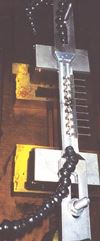
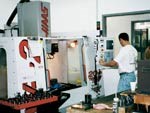
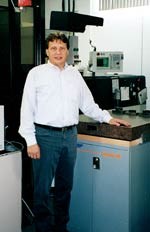
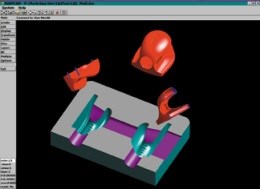
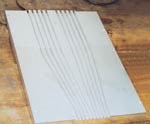
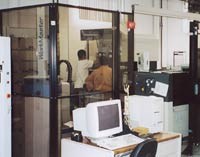



-02.jpg;maxWidth=300;quality=90)











